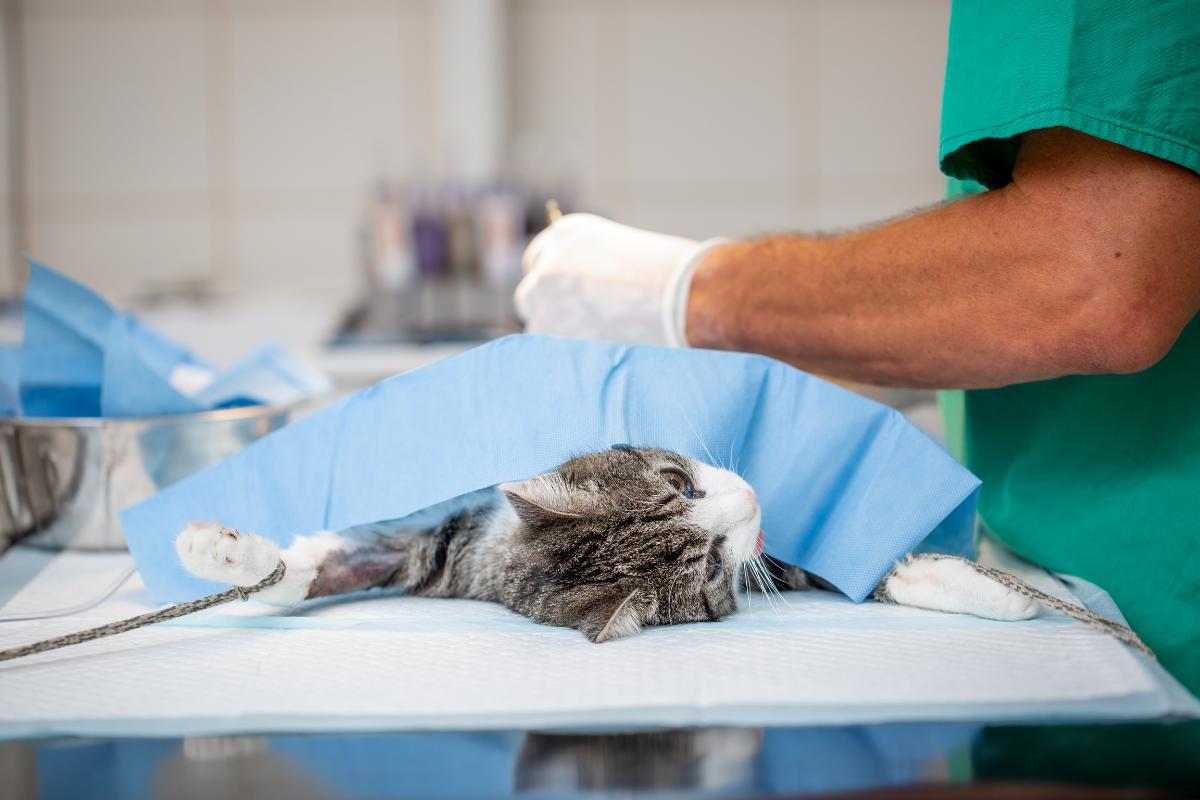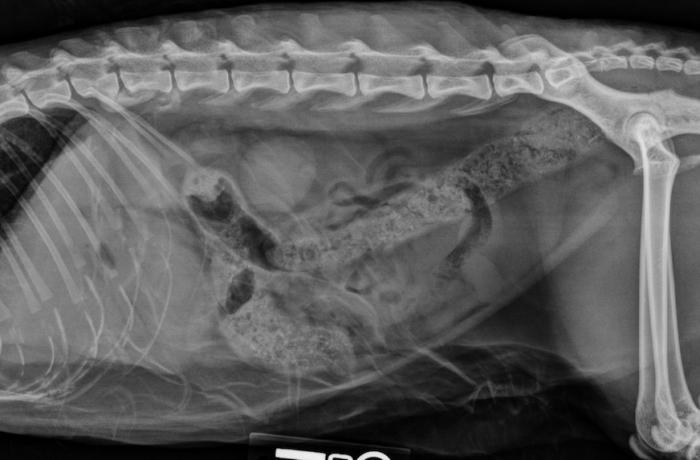Intestinal Lymphoma in Cats



See files for Cats
Intestinal lymphoma in cats is a malignant tumor originating from lymphocytes, which can affect both the small and large intestines. Its clinical presentation often resembles that of other digestive disorders, underscoring the importance of conducting a thorough differential diagnosis to distinguish it from similar pathologies. Differentiating intestinal lymphoma from other diseases with similar symptoms is essential to ensure the cat receives the specific care and intervention they require.
The following AnimalWised article explains what intestinal lymphoma in cats is, as well as its causes, symptoms, and treatment options.
What is an intestinal lymphoma in cats?
Lymphoma, a type of cancer originating from lymphocytes, essential immune cells found throughout the body. When lymphoma affects the intestine, it takes the form of intestinal lymphoma.
In feline cases, lymphoma stands out as the most common tumor, with digestive lymphoma being particularly prevalent among older cats. This tumor can present in two distinct patterns:
- Focal presentation: this variation appears as one or multiple masses infiltrating the intestinal lumen, causing obstruction and discomfort in localized areas.
- Diffuse presentation: in this scenario, the tumor induces a widespread thickening of the intestinal wall, affecting larger regions and potentially leading to more extensive complications.
Furthermore, based on the degree of maturation of the tumor cells, two types of lymphomas are identified:
- Small or mature cell lymphoma: these lymphomas are typically low-grade, characterized by a slower rate of cell proliferation.
- Large or immature cell lymphoma: conversely, these lymphomas are often high-grade, as the cells multiply rapidly, leading to more aggressive behavior.
You may find this other article of interest, as it delves into greater detail on what to expect when caring for cats with cancer.

Causes of intestinal lymphoma in cats
In feline cases, intestinal lymphoma is classified into two types based on its causative factors:
- Spontaneous intestinal lymphoma: this form occurs without a known specific cause. It is understood that a mutation in the genetic material takes place, leading to the development of the lymphoma. However, the exact trigger or factor responsible for this mutation remains unidentified.
- Intestinal lymphoma of viral etiology: this type of intestinal lymphoma is primarily associated with infections caused by the feline leukemia virus (FeLV). The presence of the FeLV virus is considered a significant contributing factor to the development of this form of lymphoma.
Age plays a crucial role in the occurrence of these lymphoma types. Spontaneous intestinal lymphoma is more commonly seen in older cats, typically those aged over 7 years. On the other hand, the viral form of the disease is more prevalent in younger cats, usually those under 2 years of age.
Furthermore, there appears to be a gender-related disparity in the incidence of the viral form of intestinal lymphoma. It is observed that this variant is more frequent in male cats. One potential explanation for this is that male cats tend to exhibit more "stray" behaviors, leading to increased exposure to potential infections like FeLV.
To gain more insights into feline leukemia virus (FeLV), we recommend reading this additional article.
Symptoms of intestinal lymphoma in cats
The symptoms of intestinal lymphoma in cats can indeed vary based on the form of presentation (focal or diffuse) and the degree of maturation of the tumor cells. However, there are some common clinical signs that are often observed in cats affected by this condition.
Generally, cats that develop intestinal lymphoma tend to exhibit a digestive picture, which includes:
- Vomiting: Cats may experience recurrent or persistent vomiting, which can be a prominent indicator of intestinal distress.
- Diarrhea: Chronic or intermittent diarrhea is another common symptom, often accompanied by changes in stool consistency.
- Changes in appetite: Cats may show alterations in their appetite, which can manifest as increased hunger (polyphagia) or decreased appetite (anorexia).
- Rapid and marked weight loss: Unexplained and significant weight loss is frequently observed in cats with intestinal lymphoma, leading to a noticeable decline in their overall body condition.
It's important to note that these symptoms can be indicative of various gastrointestinal disorders, making a thorough veterinary evaluation essential for accurate diagnosis and appropriate management.

Diagnosis of intestinal lymphoma in cats
The clinical presentation of intestinal lymphoma in cats shares similarities with other gastrointestinal diseases, including chronic enteritis, parasitism, hyperthyroidism, and other tumors. As a result, a thorough and accurate differential diagnosis becomes crucial.
To establish a definitive diagnosis of intestinal lymphoma, a comprehensive diagnostic protocol may be followed, which includes several tests:
- Blood analysis: while it may not confirm the lymphoma diagnosis, blood analysis is essential to assess the overall health of the cat and determine whether they are suitable candidates for a chemotherapy protocol or other treatments.
- Imaging tests: ultrasound and endoscopy play crucial roles in visualizing the intestinal tract, aiding in the identification of any abnormalities or potential tumors.
- Bone marrow puncture: this test helps determine if the bone marrow, which produces blood cells, is affected by the disease.
- Biopsy and histopathological analysis: although the preceding tests can provide valuable information, a definitive diagnosis is confirmed by obtaining a sample of the affected tissue and examining it at a microscopic level. This process allows for a precise identification of the type of tumor and aids in distinguishing intestinal lymphoma from other gastrointestinal pathologies.
It is important to be aware that intestinal lymphoma can coexist alongside other intestinal disorders, which can complicate the diagnostic process. This emphasizes the significance of skilled veterinary evaluation, as well as the use of a combination of diagnostic tools, to arrive at a reliable and accurate diagnosis.
Treatment for intestinal lymphoma in cats
The treatment and prognosis of feline intestinal lymphoma are influenced by several factors, including the location of the tumor within the intestine, the type of lymphoma, and the specific segment of the intestine affected.
In general, there are two main approaches to treating intestinal lymphoma in cats:
- Surgical treatment: this option is considered in cases where cats have large solitary masses in the intestine. Surgical removal of the mass may be attempted to alleviate obstruction and improve the cat's overall condition.
- Chemotherapy: is typically the preferred therapy for most cases of feline intestinal lymphoma. There are various chemotherapy protocols available for treating gastrointestinal lymphoma in cats. Chemotherapy aims to manage the progression of the disease, control the cancer, and improve the cat's quality of life by reducing symptoms and extending survival time.
It is essential to understand that while treatment can be effective in managing feline intestinal lymphoma, the primary goal is not to cure the animal. Instead, the focus is on improving the cat's quality of life and providing them with the best possible outcome. Chemotherapy protocols are designed to strike a balance between effectiveness and minimizing side effects to enhance the overall well-being of the cat during treatment.
Life expectancy for cats with intestinal lymphoma
The prognosis for lymphomas, especially large cell lymphomas, can be poor without treatment, with a survival period of as little as 2 months. However, with appropriate treatment, such as chemotherapy, the outlook can significantly improve, and the survival time of the affected cat can be extended up to 12 months.
The decision of whether to proceed with treatment for intestinal lymphoma is undoubtedly a challenging one for caregivers. Predicting how an individual animal will respond to treatment is not always possible, adding to the complexity of the decision-making process. However, it's essential to consider that the initial response to chemotherapy is often indicative of the overall effectiveness of the treatment.
Typically, within 1-2 weeks of starting chemotherapy, there will be observable changes in the cat's condition. This early response can provide valuable insights into the treatment's efficacy and guide caregivers in making informed decisions. Therefore, if there is uncertainty about proceeding with chemotherapy, it is advisable to try the treatment. If improvements are not seen or if the cat does not tolerate the medication well, the treatment can be adjusted or discontinued as needed.
Close monitoring of the cat's response to treatment, along with regular communication and collaboration with the veterinarian, is crucial in tailoring the most appropriate and effective approach to managing intestinal lymphoma. Each cat's situation is unique, and personalized care can make a significant difference in maximizing the cat's comfort and quality of life during treatment.
For a more comprehensive understanding of cancer in cats, we encourage you to read this additional article.
This article is purely informative. AnimalWised does not have the authority to prescribe any veterinary treatment or create a diagnosis. We invite you to take your pet to the veterinarian if they are suffering from any condition or pain.
If you want to read similar articles to Intestinal Lymphoma in Cats, we recommend you visit our Other health problems category.







